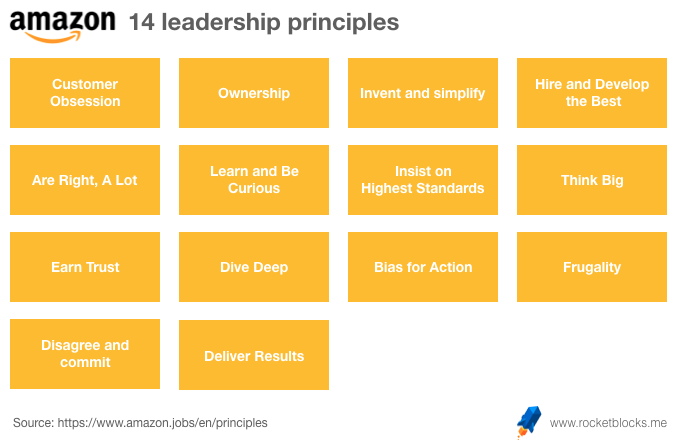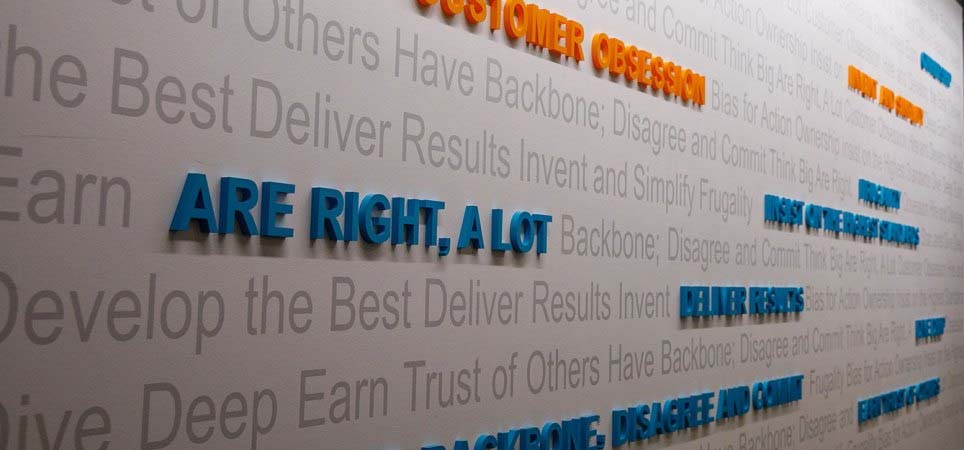Amazon is arguably one of the best product companies in the world. While Jeff Bezos surely has to do with that, Amazon Product Managers have a lot to do with that. Amazon nurtures Product Managers through a well-defined product management process and, of course, the daily use of Amazon Leadership Principles. These principles are not only for Product Managers, all Amazonians use the principles every day, whether they are discussing ideas for new projects or deciding on the best approach to solving a problem. However, the principles are especially important for Product Managers, since they build the products that fuel Amazon's immense success. Let's have a look at how Amazon Leadership Principles guide great Product Managers.

Four principles that Product Managers should live by
The first and most important Amazon Leadership Principle is Customer Obsession. In fact, Amazon's vision is to be the most customer-centric company. That obsession is driving Amazon's products success. Customer obsessed Product Managers
- know who the customer is and deeply understand the customer underlying needs and pain points
- assess the consequences that every decision have on the customer
- work vigorously to earn and keep customer trust, which sometimes means saying no to the customer
- identify metrics to understand whether a product is delivering an exceptional customer experience
Always start with the customer and work backwards!
The second principle is Ownership. This principle likens the first principle of The Toyota Way (which has had a tremendous impact on my career, but that would be the topic of a different blog post). "Owners" think long-term, they don’t sacrifice long-term value for short-term results. They think and act on behalf of the entire company. Amazon really dislike people who say "that is not my job!" and so should you. That really resonated with me. Finally, ownership is about taking initiative (i.e., working independently), making tough decisions, and taking responsibility for your mistakes.
The next guiding principle is Bias for Action. This one is very much aligned with Agile Software Development. Agile advocates for rapid delivery to get feedback and adapt if necessary. The premise in the Bias for Action principle is that many decisions are reversible and do not need thorough analysis, but calculated risks. As in Agile, Amazon likes to ship quickly, prefers to learn from doing and measuring over performing user research and making projections.
The last principle of this section is Have Backbone; Disagree and Commit. Regardless of their role, everyone should challenge decisions when they disagree. That is a trait of professional and competent people. And that is what Amazon wants from this principle. This conviction is especially critical for Product Managers, so they are leaders and visionaries. They set the vision for the product and drive the product team towards that vision. That said, building a product is a team effort, so commit wholly once the decision is determined. That is, sense the right time to move forward regardless of your disagreement.
Five principles very related to product
As visionaries, Product Managers Think Big and can develop and articulate a bold vision. Thinking small is a self-fulfilling prophecy.
Invent and Simplify is a principle that reminds Product Managers not to fall into the "not invented here" trap, so they are externally aware and look there for new ideas. Product Managers that abide by this principle create solutions when there is no obvious answer.
The next principle is Frugality. Product Managers that value frugality provide customers with as much value for as little cost as possible, and they can still maintain a constant drive for innovation.
The principle of Dive Deep also makes this shortlist. This principle also relates to one of the principles in The Toyota Way (#12): "Go and see for yourself to thoroughly understand the situation," or "Genchi Genbutsu." Product Managers that dive deep like to stay connected to details. Great Software Product Managers act as a catalyst between business and engineering, enabling information to flow in both directions, being able to discuss technical details with developers, and also expose them to the business. This, in turn, empowers developers to make value-added technical decisions.
Product Managers' job is to Deliver Results, to launch the right products at the right time. To do that, great Product Managers value action over perfection. They really dislike slipped deadlines. Most often, the right solutions are 80% good solutions.
The last five principles to make you and your team better
The first principle of this block is to Insist on the Highest Standards. In Amazon, Product Managers are continuously raising the bar, which drives their teams to deliver quality products. Amazon's push for highest quality starts in its hiring process, in which an interviewer called "the bar raiser" ensures high quality hires. A good example of pushing on standards is that of Steve Jobs’ obsession with the quality of the things unseen. In this example, Jobs rejected the designs of the original logic boards inside of the Apple II as the ‘lines were not straight enough’. High-quality products deliver high quality in every little corner of the product.
Another trait of a great Product Manager is that they Are Right, A Lot. They have strong judgment and product intuition. When they don't have any data in front of them, they default to a decision-making process that rarely disappoints. They produce solutions as quickly as possible and make a lot of decisions with little information. The key to this is to start by disconfirming their own beliefs by seeking diverse perspectives. This is another trait that Amazon looks closely at to raise the bar.
Product Managers are at the epicenter of innovation, to Learn and Be Curious are the skills that power innovative Product Managers. Curiosity is a critical skill for inventors, and a Product Manager is a sort of inventor. Curiosity is an essential antecedent to thinking outside the box. Great Product Managers are curious in nature, and they never have enough of learning new things and exploring new ideas.
Building products is a team effort, Product Managers need to Earn Trust of different disciplines to become the glue that helps to keep the extended team together (i.e., engineering, leadership, marketing, sales...). Without trust, teams cannot perform to their fullest. Trust speeds up decisions, fosters innovation, and increases profitability. You earn trust by being the first to trust, showing concern for others, and sharing knowledge and information (i.e., show you are a competent Product Manager). Listen attentively, speak candidly, and treat others respectfully. Average Product Managers don't acknowledge their own faults and blame other people and teams instead. Great Product Managers acknowledge their own faults and learn from that to prevent it in the future.
Lastly, great Lead Product Managers Hire and Develop the Best. They are not afraid of working with and hiring people smarter than them. Jeff Bezos has a number of questions he asks his hiring managers to evaluate candidates, a critical one being "will you admire this person?"
That's all folks!
While there is no magic recipe to build great products, Amazon Leadership Principles provide excellent guidance for Product Managers to build better products. Just don't think that will happen overnight, these principles must be put in practice every day until they become ingrained into your Product Manager repertoire.
I hope you are enjoying reading my posts. I would love hearing what you think about these guys and/or what other means you use to stay updated.
Don't miss my next posts! I owe you one about Product Requirement Documents (aka PRDs), and I am also planning to put together my list of key Product Management resources.
Stay tuned!
